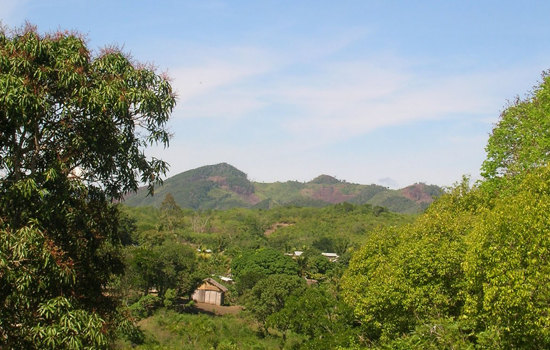Read the first-person "day in the life" account of being a Peace Corps volunteer in Madagascar, by Emory College alumna and Public Health master's student Maya Rao.
4:30 a.m. The house is still pitch dark. The crow of a lone rooster and the chill of the winter air pull me momentarily out of sleep. I grab my light sleeping bag and throw it over me for extra warmth in my semiconscious state. An hour later, the chorus of crowing roosters arouses me again, and the village awakens with the echoes of rhythmic rice-pounding, the whining of drowsy babies, and the quiet chattering of women starting their cook-fires and fetching water.

6:00 a.m. It’s still quite chilly, but I throw on shorts and a tank top and head out the door for my morning run. Most families are just waking up and cooking breakfast as the sun rises, so the path out of the village is almost empty. I pass a few early morning travelers as I jog slowly up the steep, one-kilometer hill to the main road. A few fellow villagers call out to me as I pass, and I invite them to join me, though I know they never will. Their lives are too full every day with hard physical labor. They have no energy to spare for my purely whimsical, recreational exertion. At last I reach my wooden hut after greeting my neighbors. I chug some water and take a refreshing, shockingly cold bucket bath in my three-sided, roofless shower made of traveler’s palm leaves.

8:00 a.m. I bundle up with a light sweater and head to the village clinic. On the way there I pass my neighbor, setting his freshly harvested and cooked vanilla out in the sun to dry. The fragrance is deliciously sweet and permeates the entire village.

Throughout the morning I help the local health workers weigh babies and teach mothers about nutrition and family planning. Since our nutrition worker has been consistently meeting with the young mothers in the village for several years now, most of the babies we weigh are in the healthy green zone, meaning their weight for age is where it should be. A few children are underweight, though, so we counsel the mothers on how to promote their children’s growth. Among the suggestions we give them are washing hands with soap before eating to prevent diarrhea and feeding their babies the appropriate weaning foods that include protein from local, affordable ingredients such as peanuts or dried fish.
Noon. Back at my house, I make rice and cucumber salad and then read lazily into the afternoon. The neighborhood kids come over to color and play cards on my porch. Today, there is added excitement. They have caught a mouse lemur in the woods and have brought it over to show me.

3:00 p.m. Some of the neighborhood women come to my gate and beckon me to come join them on the soccer field. Though I’m somewhat dissuaded by the afternoon heat and tired from my morning run, I put on some shoes to go play, knowing it will be a good opportunity for me to bond with the village women. After practice, the whole team celebrates on my next-door neighbor’s porch.

4:00 p.m. I head to the elementary school for the weekly adult English class. I teach my students vocabulary for body parts and directions. To accompany the lesson, we learn the Hokey Pokey, which everyone thoroughly enjoys—Malagasies love to dance. We laugh at each other as we shake our left arms or right legs or hips and dance in circles. I wrap up the session at dusk, as it is too difficult to see in the unlit classroom.

5:30 p.m. I take a walk through the village to buy some produce for the evening. I pick up greens and tomatoes for dinner. On the coast of Madagascar, there are always plenty of bananas to be found, so I also grab a pile of the ubiquitous yellow fruit for tomorrow morning’s breakfast.

6:00 p.m. The sun is already setting, so I cook dinner before it’s too dark for me to see. I read and write letters by the light of my solar-powered lamp and listen to the BBC World News on my shortwave radio to pass the time before turning in for an early night.
A 2009 graduate of Emory College, Maya Rao has spent the last three years in the Peace Corps, first in Niger, then in Madagascar. She will return to Atlanta this fall as a student in the Rollins School of Public Health.
